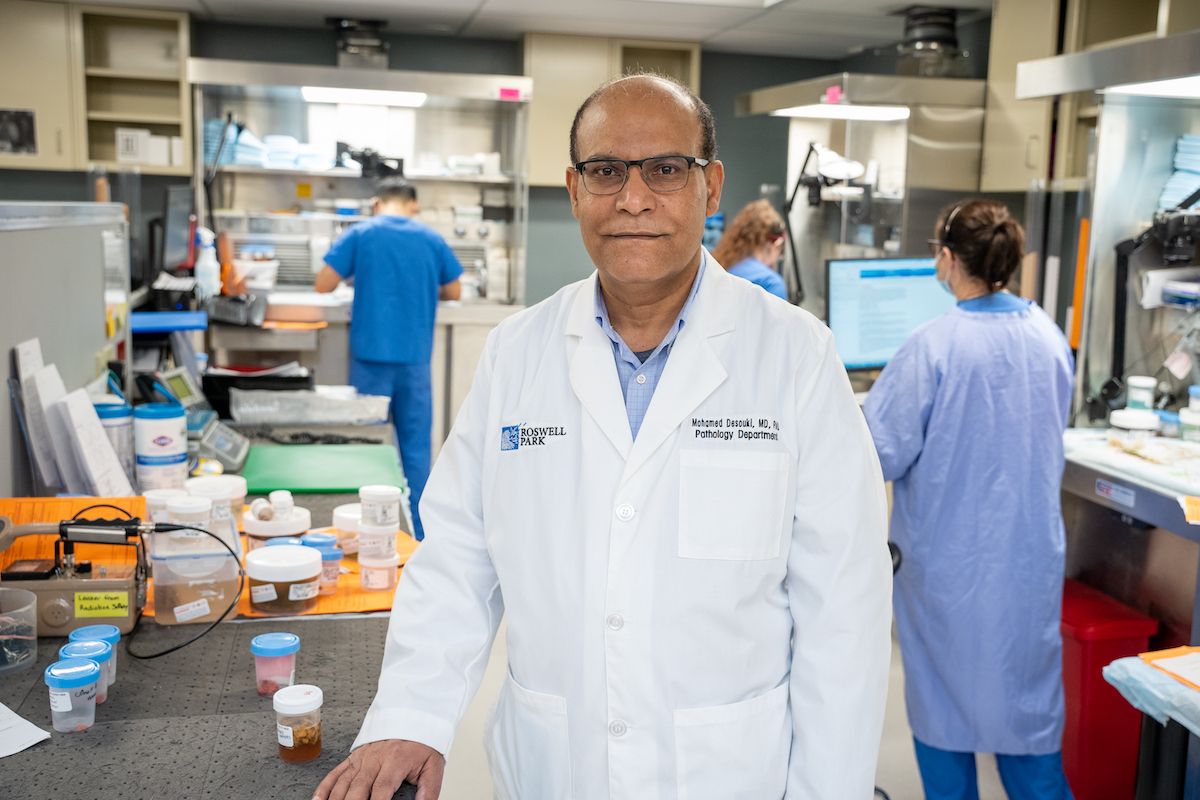When a woman is diagnosed with a cancer of her cervix, uterus, ovaries or another portion of her reproductive or genital system, she will need to rely on the gynecologic pathology team to pinpoint a precise and accurate diagnosis in order to establish her course of treatment.
While the pathologist is often the one member of the care team that the patient may never meet, this specialist is arguably one of the most critical: “No treatment or specific management will take place unless a pathology diagnosis is made beforehand,” says pathologist Mohamed Desouki, MD, PhD, of Roswell Park Comprehensive Cancer Center. “Everything in a patient’s treatment plan relies mainly on the pathologic diagnosis.”
Is it cancer?
Some gynecological cancers are found through routine screenings, such as Pap and HPV testing to screen for cervical cancers. Others are detected when symptoms, such as abnormal vaginal bleeding, pelvic pain, or ongoing abdominal bloating, warrant imaging and biopsy.
Whether it’s for routine screening or an actual biopsy, the tissue samples that are collected are sent off for testing. If any abnormalities are found, a woman should be referred to an oncologist, with those samples sent along for further testing — This is where the GYN pathology team comes in. This group of specialists determines whether the abnormal cells are malignant or benign, at an early or advanced stage, an aggressive subtype or not.
Subspecialty expertise
At Roswell Park, every patient has their samples reviewed and/or retested by our own pathologists. In 11 to 18 percent of these “secondary reviews” the diagnosis is changed, affecting every treatment decision going forward. This additional review and testing can allow some women to avoid unnecessary chemotherapy or surgery, while others might take a more aggressive course of treatment with their confirmed cancer based on certain parameters in the tumor.
The gynecologic pathology team at Roswell Park works with thousands of cases each year. That kind of experience, coupled with the pathologists obtaining specialty training in gynecologic pathology, means each patient receives a more precise and accurate diagnosis than what would be provided by general pathologists. “We have access to a state-of-the-art immunohistochemistry and molecular laboratory where more advanced techniques are applied in difficult cases to reach the right diagnosis,” Dr. Desouki says.
Cancer screening and prevention
It matters who conducts your tests and interprets your results. At Roswell Park, our detection experts focus exclusively on cancer every day.
Learn MoreProviding critical analysis during surgery
While biopsies can provide key information, they don’t reveal everything your physician needs to know. And in some situations, such as ovarian masses, biopsies are not performed. As a result, many questions cannot be precisely answered before surgery: How deep has a tumor invaded the uterine wall? Has cancer advanced into lymph nodes? Are other organs involved?
At Roswell Park, GYN pathologists are on standby to make analyses during a patient’s surgery. Once the surgeon removes the uterus, ovary, lymph nodes, or other tissue samples from the pelvic cavity, they are sent to the GYN pathology team for immediate examination and testing. The results help direct the surgeon’s decisions on how extensive the surgery should be and save the patient from unnecessary procedures. For example, if it turns out that the removed ovary is not cancerous, the surgeon’s work is completed. But if the ovary is cancerous, the surgeon may proceed with a total hysterectomy or a more extensive operation.
Reading your pathology report
While the pathology report is issued and communicated to the patient’s care team to formulate an appropriate treatment plan, patients can access their report through the MyRoswell Patient Portal. “In addition, patients may access to the pathologist’s contact information to ask any questions she might have, about her diagnosis as well as the tumor’s type, grade, stage and her prognosis,” Dr. Desouki says.


